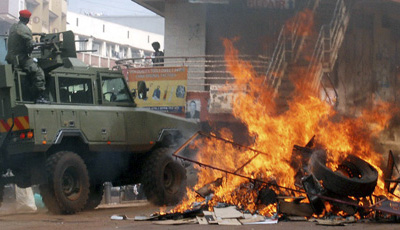Egyptian journalists accused of ‘insulting armed forces’
New York, March 9, 2012–Egyptian authorities should immediately dismiss a baseless complaint of antistate activities that has been lodged against several journalists, the Committee to Protect Journalists said today. The case has been referred to military prosecutors as part of a broader practice that has raised constitutional and international concerns.
Kuwaiti daily suspended for ‘creating sectarian strife’
New York, March 5, 2012–Kuwaiti authorities must lift their suspension of the privately owned newspaper Al-Dar and drop antistate charges lodged in connection with articles that sought to defend the country’s Shiite minority, the Committee to Protect Journalists said today.

Despite pardon, Correa does lasting damage to press
New York, February 27, 2012–Ecuadoran President Rafael Correa announced today that he would pardon several news managers and journalists he had sued for libel, but his actions in the cases have done grave damage to free expression in his country, the Committee to Protect Journalists said today. Correa had won separate libel complaints against executives of…
Kyrgyz government blocks access to news website
New York, February 23, 2012–The Kyrgyz government’s decision to block access to the independent news website Ferghana News contradicts the country’s declared commitment to press freedom and should be overturned immediately, the Committee to Protect Journalists said today.

Attacks on the Press in 2011
Trade and the Internet are turning us into global citizens, but the news we need to ensure accountability is often stopped at national borders. China is ramping up censorship, Iran is jailing dozens of journalists, and Turkey is using nationalist laws to stifle critical reporting. In Mexico criminals are dictating the news, while in Pakistan…

Attacks on the Press in 2011: Regulating the Internet
Legislation for Internet security can quickly turn into a weapon against the free press. Cybercrime laws are intended to extend existing penal codes to the online world, but they can easily be broadened to criminalize standard journalistic practices. By Danny O’Brien
Attacks on the Press in 2011: State Media As Anti-Media Tool
In some Latin American countries, state-owned media are used not only for propaganda but as platforms to smear critics, including journalists. Some elected leaders have even invested in large multimedia holdings to further their agendas. By Carlos Lauría

Attacks on the Press: Will Philippines Fail on Maguindanao?
Nearly two years since 32 journalists were murdered, the fight for justice has both intensified in rhetoric and bogged down in technicalities. Without a greater commitment of resources, the litmus test is one the Philippines could fail. By Shawn W. Crispin
